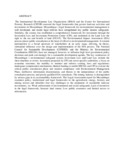Legal frameworks enabling sustainable land-use investment in Mozambique: current strengths and opportunities for improvement

View/
Date
2015Author
Chiziane, E
Gift, R
Kibugi, R
Wardell, DA
Cordonnier-Segger, M. - C
Haywood, C
Language
enMetadata
Show full item recordAbstract
The International Development Law Organization (IDLO) and the Center for International Forestry Research (CIFOR) assessed the legal frameworks that govern land-use activities and investments in Mozambique. Mozambique’s legal framework for environmental management is well developed, and recent legal reforms have strengthened key public interest safeguards. Similarly, the country has established a comprehensive framework for investment through the Investment Law and Investment Promotion Centre (CPI), and enshrined in the Land Law the right to the use and benefit of land (DUAT). The Environmental Impact Assessment (EIA) process places public consultation at the heart of effective environmental management. It extends participation to a broad spectrum of stakeholders at an early stage, allowing, in theory, substantial influence over the design and implementation of the EIA process. The National Council for Sustainable Development (CONDES) and the Ministry for Environmental Coordination (MICOA) have not managed, however, to influence high level government policy decisions and push convincingly for a sustainable development agenda.
The key weaknesses of Mozambique s environmental safeguard system, Investment Law and Land Law include the short timelines to review investment proposals by CPI and sector-specific authorities; a focus on economic outcomes; the inability to monitor and enforce existing laws and regulations; inadequate compensation mechanisms; limited funding to enable MICOA and CPI to oversee the critical public consultation phase and monitor compliance with Environmental Management Plans; ineffective information dissemination, and threats to the independence of the public consultation process; and poorly qualified EIA consultants. The mining industry is distinguished by serious gaps in its accountability framework.
This Legal Assessment report for Mozambique examines policy, institutional and legal frameworks in the agricultural, energy, forestry and mining sectors and identifies four key challenges to the attainment of sustainable land-use investments, viz.
Weak enforcement of environmental and social safeguards;
Lack of incentives in the legal framework;
Insecure land tenure;
Low public awareness and limited access to information.
URI
http://www.cifor.org/library/5759/legal-frameworks-enabling-sustainable-land-use-investment-in-mozambique-current-strengths-and-opportunities-for-improvement/http://hdl.handle.net/11295/92370
Citation
Chiziane, E., Gift, R., Kibugi, R., Wardell, D. A., Cordonnier-Segger, M. C., & Haywood, C. (2015). Legal frameworks enabling sustainable land-use investment in Mozambique: Current strengths and opportunities for improvement (No. CIFOR Working Paper no. 193). Center for International Forestry Research (CIFOR), Bogor, Indonesia.Publisher
University of Nairobi
Collections
- Reports [373]
